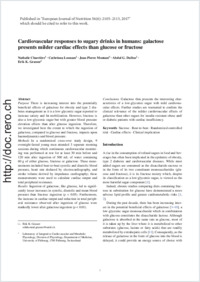Cardiovascular responses to sugary drinks in humans: galactose presents milder cardiac effects than glucose or fructose
- Charrière, Nathalie Laboratory of Integrative Cardiovascular and Metabolic Physiology, Division of Physiology, Department of Medicine, University of Fribourg, Switzerland
- Loonam, Cathriona Laboratory of Integrative Cardiovascular and Metabolic Physiology, Division of Physiology, Department of Medicine, University of Fribourg, Switzerland
- Montani, Jean-Pierre Laboratory of Integrative Cardiovascular and Metabolic Physiology, Division of Physiology, Department of Medicine, University of Fribourg, Switzerland
- Dulloo, Abdul G. Laboratory of Integrative Cardiovascular and Metabolic Physiology, Division of Physiology, Department of Medicine, University of Fribourg, Switzerland
- Grasser, Erik Konrad Laboratory of Integrative Cardiovascular and Metabolic Physiology, Division of Physiology, Department of Medicine, University of Fribourg, Switzerland
-
01.09.2017
Published in:
- European Journal of Nutrition. - 2017, vol. 56, no. 6, p. 2105–2113
English
PurposeThere is increasing interest into the potentially beneficial effects of galactose for obesity and type 2 diabetes management as it is a low-glycemic sugar reported to increase satiety and fat mobilization. However, fructose is also a low-glycemic sugar but with greater blood pressure elevation effects than after glucose ingestion. Therefore, we investigated here the extent to which the ingestion of galactose, compared to glucose and fructose, impacts upon haemodynamics and blood pressure.MethodsIn a randomized cross-over study design, 9 overnight-fasted young men attended 3 separate morning sessions during which continuous cardiovascular monitoring was performed at rest for at least 30 min before and 120 min after ingestion of 500 mL of water containing 60 g of either glucose, fructose or galactose. These measurements included beat-to-beat systolic and diastolic blood pressure, heart rate deduced by electrocardiography, and stroke volume derived by impedance cardiography; these measurements were used to calculate cardiac output and total peripheral resistance.ResultsIngestion of galactose, like glucose, led to significantly lesser increases in systolic, diastolic and mean blood pressure than fructose ingestion (p < 0.05). Furthermore, the increase in cardiac output and reduction in total peripheral resistance observed after ingestion of glucose were markedly lower after galactose ingestion (p < 0.01).ConclusionsGalactose thus presents the interesting characteristics of a low-glycemic sugar with mild cardiovascular effects. Further studies are warranted to confirm the clinical relevance of the milder cardiovascular effects of galactose than other sugars for insulin resistant obese and/or diabetic patients with cardiac insufficiency.
- Faculty
- Faculté des sciences et de médecine
- Department
- Département de Médecine
- Language
-
- English
- Classification
- Dietetics, nutrition
- License
-
License undefined
- Identifiers
-
- RERO DOC 305741
- DOI 10.1007/s00394-016-1250-9
- Persistent URL
- https://folia.unifr.ch/unifr/documents/305997
Statistics
Document views: 109
File downloads:
- pdf: 261
